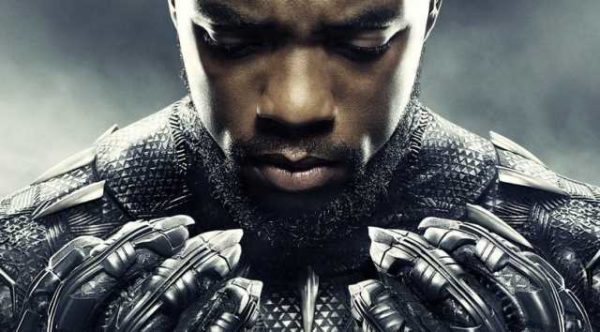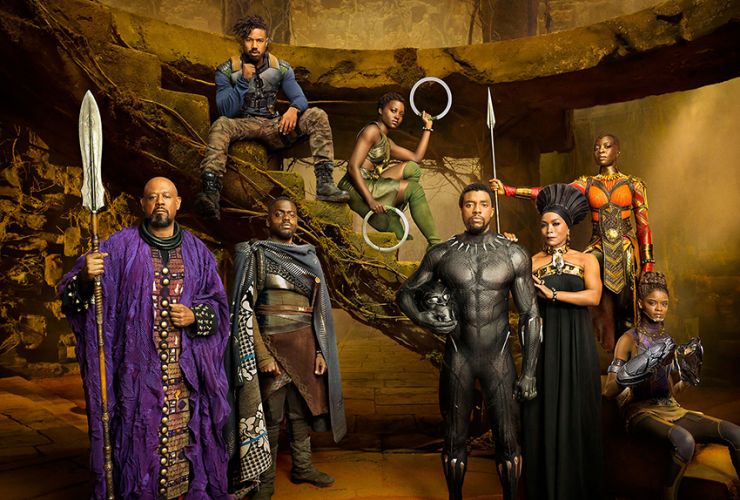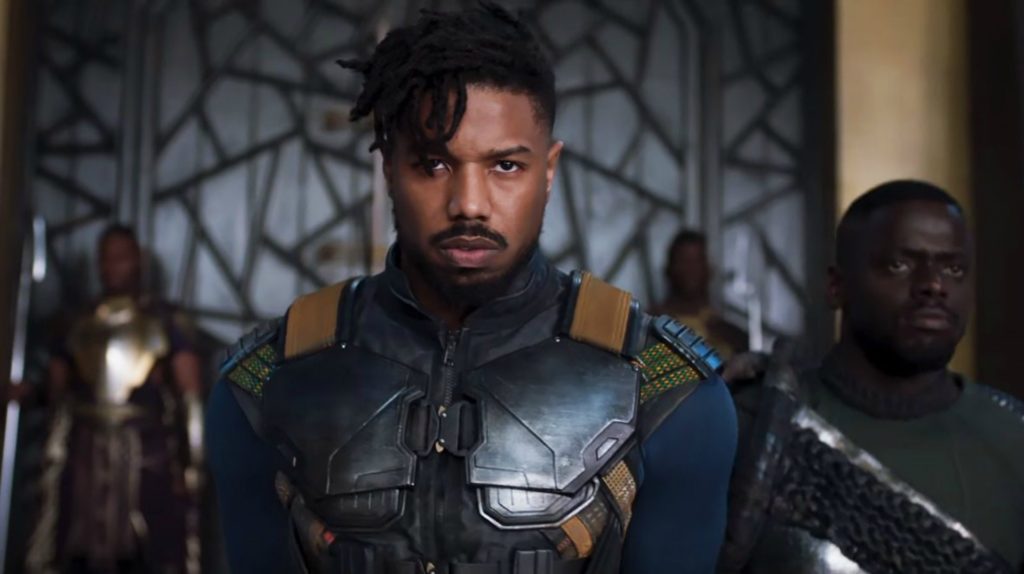In Black Panther Chadwick Boseman walks with the weight of the world on his shoulders. Not only because he plays a king (uneasy lies the head that wears a crown), but also because he bears the brunt of the audience’s expectations. Ryan Coogler’s new film, the latest instalment in the Marvel franchise, is the first blockbuster to star a mainstream black superhero and to feature an all-star, predominantly black cast. Hopes were high. The film fulfils and in many ways exceeds them.
Boseman plays T’Challa, king of Wakanda, a small African nation that is secretly the most technologically advanced on the planet. Like his ancestors before him, T’Challa has also taken up the mantle of the Black Panther: protector of the Wakandan people, imbued with preternatural strength and senses. But with great power comes great uncertainty. T’Challa acceded to the throne suddenly and he worries he isn’t ready to be king. His fears are confirmed at his coronation when M’Baku (Winston Duke), leader of the recalcitrant Jabari tribe, questions his right to rule and challenges him to single combat. Their fight on the crest of a waterfall, water rushing beneath their feet into the cauldron below, is the film’s first great set piece. At last, T’Challa wins and spares M’Baku’s life by persuading him to concede—an act of compassion that impresses even the Jabari.
But a good man doesn’t always make a good king. T’Challa struggles to reconcile his natural empathy with the demands of state. His closest friends, W’Kabi (Daniel Kaluuya), head of the Border tribe, and Nakia (Lupita Nyong’o), a Wakandan spy and T’Challa’s ex-girlfriend, both think the country should play a greater role internationally. He favours military intervention; she prefers humanitarian aid. Either option would mean abandoning Wakanda’s masquerade as a third-world country and ending centuries of isolationism. It’s a risk T’Challa isn’t willing to take. One of Wakanda’s recent brushes with the outside world was the intruder Ulysses Klaue (Andy Serkis), a black-market arms dealer and thief—hardly a man to inspire faith in foreign probity. (T’Challa swears he will personally bring him to justice, a promise with unforeseen consequences.) Still T’Challa weighs their opinions carefully, as he does everything. Boseman is stoic, restrained, but offers glimpses of the vulnerable young man just beneath the surface. T‘Challa idolizes his father and when one of the man’s old mistakes comes back to haunt his family, Boseman’s anger and disbelief are palpable. Despite his personal turmoil, T’Challa’s sense of duty is unshakeable; he would defend his country with his last breath.
Wakanda itself is a blend of old and new, an Afrofuturist fantasy drawn from real African traditions and culture. Its location is left unspoken, though a quick glance at a map suggests it is in East Africa. Cinematographer Rachel Morrison creates dazzling vistas of plains and forests which give way to glistening spires. Wakanda has the world’s largest deposits of vibranium—the same metal Captain America’s shield is made from—an advantage that has helped its people develop technological marvels. Everett Ross (Martin Freeman), a CIA agent with a condescending view of Wakandan progress, ends up visiting and gawping at a maglev train. Coogler, who also co-wrote the film with Joe Robert Cole, weaves the technology into inventive action scenes, including a chase that makes the best use of a remote-controlled car since Tomorrow Never Dies. Some elements are more grounded. T’Challa and T’Chaka speak Xhosa, Ludwig Göransson’s score includes talking drums, Ruth E. Carter’s costumes reference everything from kente cloth to Basotho blankets, and the Wakandan coronation ceremony, which gives different royal houses a chance to compete for the throne, is reminiscent of the Yoruba kingship system.
Wakanda is so advanced it even takes gender equality for granted. T’Challa is surrounded by intelligent, capable women, like Okoye (Danai Gurira), the phlegmatic general of the Dora Milaje, the royal family’s elite female bodyguards. Nakia is convinced that the world needs Wakanda’s help and isn’t shy about prodding T’Challa to act. Nyong’o is passionate, but not preachy, giving Nakia an endearing stubbornness that suggests how she could care for T’Challa and yet still turn him down. But the film’s breakout character is T’Challa’s little sister Shuri (Letitia Wright), a brilliant scientist in charge of developing Wakanda’s military technology. She supplies her brother with his Black Panther super suit and the film with its biggest laughs. (When a confused Ross meets her for the first time, she greets him with a cheery “Colonizer!”) Wright delivers some of the best wisecracks in a Marvel film since Robert Downey, Jr.
Black Panther is exuberant, but it doesn’t shy away from post-colonial reality. Wakanda never endured the Berlin Conference or the slave trade; other African countries did. Although the comics predate its founding in October 1966, the name Black Panther is indelibly associated with the Black Panther Party. Few characters have embodied the consequences of racism better than Erik ‘Killmonger’ Stevens (Michael B. Jordan). Killmonger is T’Challa’s shadow, the product of centuries of violence and oppression. He grew up black in an America that seemed to punish him for the colour of his skin. He learned to hate. Talking to a white British curator who specializes in African antiquities, he makes a reference to the sack of Benin which she fails to catch. His contempt is obvious to the audience, but not to her. Killmonger’s disgust extends to the Wakandans too, who stand by as black people continue to be oppressed. Jordan releases the fury slowly, until it suddenly erupts and threatens to sear the screen. Killmonger doesn’t want reparations. He wants retribution.
It’s a pity then that the film still falls back on African stereotypes. An early action sequence involves T’Challa rescuing a group of girls from armed guerrillas. The words Chibok and Boko Haram aren’t spoken, but the scene explicitly takes place in the Sambisa Forest in Nigeria and it’s clear who the characters are meant to represent. The only Africans from a real country who are shown in a positive light are passive victims waiting to be saved. There’s no denying the threat Boko Haram poses to Nigeria’s citizens and it makes narrative sense for an African hero to come to the rescue. One simply hopes it would be better handled than as an excuse for a disposable action scene.
Still, Black Panther is a giant leap forward. It puts paid to the idea that black superheroes are less appealing to mass audiences than their white counterparts. It showcases an all-star black cast. It creates a world which feels vibrant and lived in. It asks essential questions about black history and culture, while also finding room for well-choreographed fight scenes. It was made with intelligence and pride. The Wakandan motto is “Wakanda forever”. It could also be “say it loud, I’m black and I’m proud”.



Leave a Reply